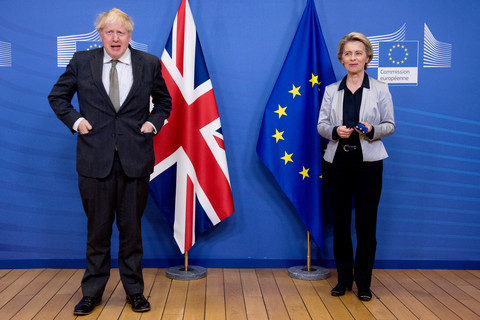[ad_1]

British prime minister Boris Johnson hit a conciliatory tone on Monday (22 March) in the vaccine-export row between the UK and the EU – ahead of a meeting of EU leaders later this week.
Johnson said that the EU does not want to launch a vaccine battle, adding that avoiding blockages of vaccine supplies is key for countries working together on immunisation, Bloomberg reported.
EU Commission president Ursula von der Leyen last week warned that the bloc could restrict vaccine exports to the UK, as the EU executive aims to make sure the pharmaceutical company AstraZeneca delivers the doses pledged to the EU.
“I’m reassured by talking to EU partners over the last few months that they don’t want to see blockades,” Johnson said in comments as the export ban debate flared up over the weekend.
The vaccine row and trade disputes over Northern Ireland have put the fragile post-Brexit UK-EU relationship under increased pressure.
The British premier has been in contact with Dutch prime minister Mark Rutte and Belgian PM Alexander De Croo ahead of the online-only EU summit later this week, where leaders are expected to discuss the broader export ban.
“We are all facing the same pandemic, we all have the same problems,” Johnson said.
The commission’s dispute is primarily with AstraZeneca. Von der Leyen said at the weekend that the firm had delivered only 30 percent of the 90 million vaccine doses it had promised for the first quarter of 2020.
“We have the option of banning a planned export. That’s the message to AstraZeneca: you fulfil your contract with Europe first before you start delivering to other countries,” she told Germany’s Funke media group.
The company has blamed production delays at its European plants – but it has been able to deliver doses under its UK contract.
The current row centres around a stockpile of the Astra vaccine’s active ingredient produced in the Netherlands by subcontractor, Halix.
The factory does not yet have regulatory approval to supply to the EU, but is expected to receive it soon from the European Medicines Agency (EMA).
It is named as a supplier of vaccines in both the contracts that AstraZeneca has signed with Britain and with the EU.
“This is not about banning vaccine exports, this is about making sure that companies deliver on their commitments to the member states and the EU that are inscribed in contracts,” commission spokesman Eric Mamer said.
He added that exports from companies that manufacture doses in the EU is “in itself is good a thing”.
“We want to see reciprocity and proportionality in these exports,” Mamer said.
According to current EU rules, the national authority notifies the commission once a vaccine producer wants to export. In case the commission and the national authority do not agree on whether to allow the export, the college of commissioners takes a decision.
All companies have introduced requests, but so far the ban was used only once – by the EU and Italy – in the case of AstraZeneca wanting to export from Italy to Australia.
The UK is the largest recipient of doses made in the EU, receiving 10 million of 41 million shots exported by the bloc, von der Leyen said last week. There have been no vaccine exports to the EU from the UK.
Ireland’s prime minister, Micheál Martin, told RTE radio he is opposed to the suggestion that the EU could impose an export ban on vaccines going specifically to the UK, describing it as a “retrograde step”.
[ad_2]
Source link